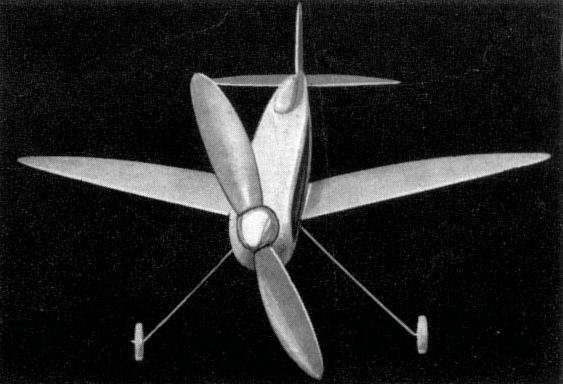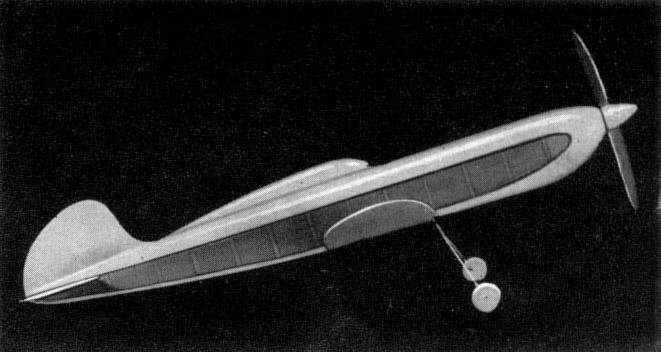|
WINGS OF MERCURY Complete data for building one by FRANK EHLING
WHY not more speed models? They always draw a crowd whenever flown. They are not hard to build yet are few and far between. Here is a good sound design that ticks over at record speed. The clean design, combined with the correct aeronautic layout, makes it perform peaceably like Clyde Beatty's lions. The Mercury racer was designed with the knowledge gathered from other ships that were built, and the layout was obtained from MODEL AIRPLANE NEWS articles, "Designing Your Models, For Speed," to which we are deeply thankful. For complete data see page 375 of "Model Airplane Design and Theory of Flight" be Charles Hampson Grant. Those who were on hand when the ship performed for the first time saw a ship that literally flew right off the drawing board. Though duration is short, the ship is as steady as a streamlined brick flying through still air, with the stamina of a vacuum cleaner salesman. Enough sales talk, now for actual construction. The wing, tail and rudder are made in the same manner as a hand launched glider. The body consists of a simple framework, and balsa blocks are used for streamlining. The prop is carved from pine, and the power is 14 strands of 1/4" flat. Do all testing over grass as this will save the life of the ship. So here we go with a little cement, balsa and paper along with some good workmanship, and before you can think twice we will have the ship ready for flight. BODY-Start by laying down two sides and when dry remove from the drawing and put in the proper cross pieces top and bottom. The balsa blocks can be cemented lightly on top and bottom and shaped, then they can be removed and the top block can be hollowed out till the wall is 1/8" thick as this takes part of the strain given by the rubber motor. When this is done cement the turtle back on firmly. The bottom cowl can be hollowed to 1/16" and cemented in place to streamline the front of our racer. Bend the landing gear to shape and cement between two 1/8" sheets as shown and cement in the fuselage. The nose plug is now carved. This is left solid as the weight is needed in the nose and the extra strength is essential when the ship is wound to the limit. The headrest can be added if desired. Fill in as shown on plan with 1/8" sheet and drill hole to accommodate 1/4" dowel; used instead of a wire rear hook. The large diameter prevents the rubber from breaking when tightly wound. The prop shaft should be well insulated with rubber tubing for the same reason. Cover the remainder of the ship with tissue. Dope the whole ship and sand; repeat until the ship has a fine smooth finish. Wheels can be made from pine or can be purchased. The prop is a very important item on a speed job as it turns over so fast, and it must he carved true and finished smooth to obtain maximum efficiency. Carve it in the usual manner after it is blanked out as shown: use 1/16" diameter wire for shaft. Use no slack because this lessens power. The wing and tail assembly are made like any hand launched glider. Follow the airfoil for the wing and use a streamline section for the rudder and stabilizer. When the surfaces are all smooth and polished, cement the wing and tail in place. Those who doubt the strength of this arrangement can only be referred to the punishment that a hand launched glider receives during its initial flights. Power is supplied through 14 strands of 1/4" flat. Lube the rubber well because it can make the fuselage look sick if it breaks. Flying is done over high grass or what the farmers call hay; this saves the ship while testing. If the model is tail heavy add some weight to the nose block, and vice versa if nose heavy. Place the wing in the position shown on plans. When flying outdoors and it is a bit windy, to determine the speed, fly with and against the wind and take the average for a fair record. VICTORY Scanned From November 1942 |


